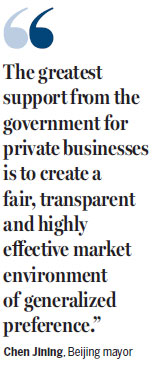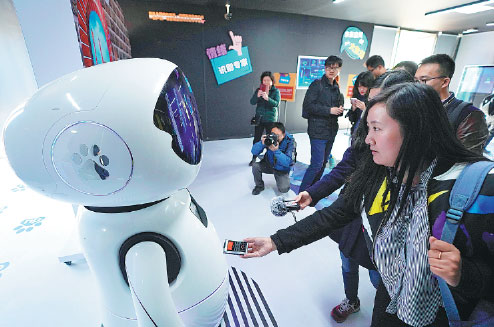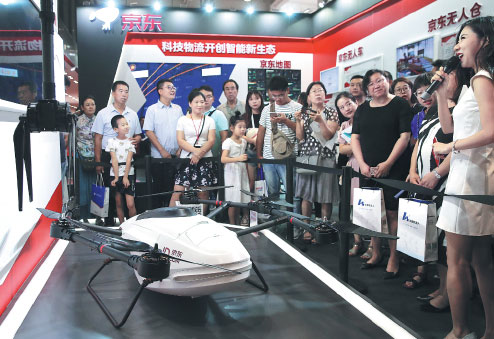Capital's leaders vow to create better business environment
Action plan to cut approval items, enabling startups to complete their procedures in two days of processing.
Senior Beijing officials are calling on private entrepreneurs to make full use of the capital's advantages in policies and innovation, grow their enterprises and strive to achieve new breakthroughs in development.
Cai Qi, Party chief of the city, made the remarks at a recent meeting with executives of private businesses.
As the capital of the country and a megacity, Beijing offers business owners huge potential in terms of investment and consumption, Cai said.
The city is rich in technological human resources, he said, adding that technological innovation centers have become a key engine to drive the growth of the local economy.

Due to their high growth and strong competitiveness, local high-tech companies, typically represented by Zhongguancun, a high-tech business hub in Beijing, are playing an active role in the city's industrial transformation, Cai noted.
He encouraged local private companies to expand investment in the latest technology, industries and business models, and increase proprietary innovations to achieve breakthroughs in core technologies.
Meanwhile, the authorities will continue to advance reforms to improve the city's business environment, he said.
Beijing has made marked progress in creating a business-friendly climate. It ranked best in an evaluation of 22 cities across the country released by the National Development and Reform Commission earlier this year, followed by Xiamen and Shanghai.
The city government rolled out an action plan last week to further optimize the local business climate for the 2018-20 period.
According to the plan, the period needed to go through all the administrative procedures required for setting up a company in Beijing will be reduced to two days in 2020 from the current eight days.
Beijing Mayor Chen Jining told People's Daily that the number of administrative approval items at the city level will be slashed to 1,130 from nearly 2,300 and that at the district level will be reduced by 50 percent to 60 percent.
The latest annual Doing Business Report released by the World Bank at the end of October showed that China's ranking has improved 32 places to 46th in terms of the business environment among 190 economies worldwide. It is the first time the country made the list of the top 50.
Beijing, one of the two sample cities in the evaluation of China's business environment, contributed greatly to the improvement in the ranking.
Officials at both city and district level will make regular visits to local companies in a bid to learn about their needs and offer services, Cai said. Their "delivery of service package" will target both leading companies and high-growth startups, as well as micro and small-sized businesses, he noted.
Officials of the city government and the Beijing Party committee have so far visited more than 300 companies to gain a deeper understanding of the city's businesses and industries and help to resolve problems facing them, according to Chen.
"The greatest support from the government for private businesses is to create a fair, transparent and highly effective market environment of generalized preference," Chen said, adding that means lifting various invisible discriminatory restrictions and reducing the institutional costs of developing a business.
"Our general principle is to combine the long-term construction of a business-friendly environment - which features fair treatment, convenient access and rule of law - with coming to the rescue by addressing the shortage of capital flows," he said.
The city government has launched more than 60 investment projects, covering a variety of sectors such as infrastructure, environmental protection, medical services, tourism and elderly care, to encourage private capital's participation.
The most distinct feature of Beijing's private economy is that innovative business owners are especially clustering around Zhongguancun, Chen said.
"Different from traditional industries, they have their own development path to follow, so we need to offer tailor-made services, rather than giving a cure-all remedy for different situations," he said.
 |
|
A visitor responds to a robot at an artificial intelligence-themed park in Beijing's Haidian district. The park, created by private-run internet company Baidu and the district government, opened its doors on Nov 1.Ju Huanzong / Xinhua |
 |
|
A drone at online retail giant JD's stand attracts visitors' attention at the World Robot Conference in Beijing in August.Wang Zhuangfei / China Daily |
